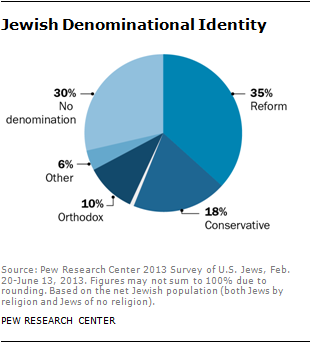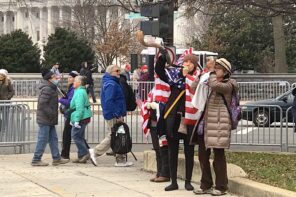During an American University panel on the recent war in Gaza earlier this month, Rabbi Shira Stutman related a story of a friend who was scandalized to learn that her rabbi served on J Street’s Rabbinic Cabinet. The friend told Stutman that she was considering leaving the synagogue she had belonged to for over 20 years—only to discover that Stutman, too, is affiliated with J Street.
“I said to her, please don’t do that, that’s the worst thing that can happen to the Jewish community,’” said Stutman, who serves the largely millennial congregation at the historic Sixth and I Synagogue in Washington, DC’s Chinatown. She said she urged her friend to meet again and again with her rabbi “until you can figure out how you can have a conversation.”
“We need to have these conversations,” said Stutman, “and I still think synagogues are the best place for them.”
Co-sponsored by J Street, the school’s J Street U chapter, and the New Israel Fund, the event was titled “Test of the Crisis in Gaza: Who We Are and What’s Next?,” an acknowledgement of the unprecedented polarization of American Jews produced by this summer’s war in Gaza.
Stutman is, along with over 840 other rabbis and cantors, a member of the Rabbinic Cabinet of J Street, the “pro-Israel, pro-peace” Washington advocacy group that arrived on the scene less than a decade ago, billing itself as a pro-Israel alternative to the long-dominant American Israel Public Affairs Committee.
Despite Stutman’s optimism about synagogues as the locus for difficult conversations about American Judaism’s most contentious topic, few rabbis believe they are able to create a space where conversations can take place without participants’ fear of recrimination.
Rabbis are “terrified” of talking about Israel, said Rabbi Jill Jacobs, executive director of T’ruah: The Rabbinic Call for Human Rights (formerly Rabbis for Human Rights-North America), which has 1800 affiliated rabbis. “Rabbis tend to be more progressive than their congregations and more knowledgeable” about Israel, Jacobs added, but fear losing their jobs, members, and donations, as well as contending with pushback from their more hawkish congregants—who may well be a very vocal minority.
Rabbi Eric Yoffie, the past president of the Union for Reform Judaism, wrote in the denomination’s magazine (“Muzzled by the Minority,” Fall, 2014) that he knew of rabbis who had expressed views “somewhat critical of Israel’s policy toward the Palestinians,” only to be met with a reaction of “such outrage, contempt, and ferocity” that they chose to “simply remain silent on the subject in public.”
A 2013 report by the Jewish Council for Public Affairs, based on an online survey of over 500 mostly Reform and Conservative rabbis, found that nearly half “hold views on Israel that they won’t share publicly, many for fear of endangering their reputation or their careers.” The survey found that 43% of rabbis who identified as dovish reported feeling “very fearful” of expressing their true views on Israel, compared to just 29% of moderates and 25% of hawks. A full 74% of the dovish rabbis reported feeling “very” or “somewhat” fearful of expressing their views.
Rabbi Sharon Kleinbaum, the Reconstructionist-ordained rabbi of Manhattan’s Congregation Beit Simchat Torah (CBST), a non-denominational, LGBT-inclusive congregation, said, “I think there’s a larger chilling effect in the American Jewish world, yes; I’ve gotten so many phone calls and voicemails [from people] who have had something happen to them—this summer I do believe it has gone off the rails.”
Yet, Kleinbaum said, “I do think my job is to create a Jewish space in which this discussion can take place without saying this person is not a good Jew and another is a good Jew. That, I think, is a reachable goal for my community.”
Many rabbis told me they simply don’t talk about Israel that much—in some cases not because they felt “muzzled,” necessarily, but because they believed their congregations to not be that interested, or the issues too complex, for a thirty minute sermon. Even the leaders of less traditional communities, like Kleinbaum’s, say that achieving the space for constructive dialogue is hard work, demanding diligence and intentionality that must be maintained not only by clergy, but by lay leaders and congregants as well. Several rabbis said the best approach was to bring in speakers of varying perspectives, and to encourage civil engagement with the speaker by congregants, a goal several said their communities had accomplished.
Younger Jews “scratch their heads,” and ask, “how can it possibly be true that Israel is not at fault in any way?”
Sharon Brous, a Conservative rabbi and founder of Ikar, a nondenominational spiritual and social justice community in Los Angeles, told me they have “worked really hard over the past decade to build a culture within the community in which people can hear voices that they strongly disagree with and sit respectfully in conversation nevertheless,” which was something she “felt both aware of and really grateful for” during the height of the Gaza war this summer.
“Poisonous Atmosphere” In the Jewish Community
Despite its dovish reputation, J Street supported Israel’s decision to launch a military attack on Gaza this summer, prompting an outcry from American Jewish progressives. Even though it supported the war—a position shared by the American Jewish establishment—the centrist newcomer continues to face hostility from the establishment. This year, it lost its bid to join the Conference of Presidents of Major American Jewish Organizations, despite support from the Union for Reform Judaism and other Conference members.
At the American University event, Jeremy Ben-Ami, J Street’s president, lamented the “poisonous atmosphere” in the American Jewish community. On September 2, he recalled, the organization sent an email condemning the Israeli government’s seizure of approximately 1,000 acres of Palestinian-owed land in the West Bank, saying that this action “casts serious doubt on the Israeli government’s sincerity in claiming to favor a two-state peace agreement with the Palestinians,” and calling on the US government to unambiguously declare settlements “illegal” as opposed to “merely ‘unhelpful’ or ‘illegitimate.’”
The reply, which Ben-Ami said came from a person “at the top of the pyramid leadership position in an umbrella organization in the Jewish community,” contained just two words: “Go away.”
“There’s far too much intolerance in the American Jewish community, the Conference of Presidents, AIPAC people, people on the right,” said Rabbi John Rosove, of Temple Israel of Hollywood, a Reform congregation in Los Angeles, and co-chair of the J Street Rabbinic Cabinet. “They need to grow up. Jews argue. We need civil discourse.”
“It’s not healthy,” said Kleinbaum, “that the Jewish community has created litmus tests for what’s okay and not okay to talk about.” The mainstream Jewish community, she added, “has brought this on itself, from my perspective, by saying that we who are dedicated to the survival of a pluralistic and just Israel are put in a very, very narrow space.”
Attempts have been made from outside their congregations to undermine both Kleinbaum and Brous. After reading the names of Palestinian civilians killed in this summer’s Gaza war, which led to the loss of one board member and a handful of congregants, Kleinbaum’s board stepped in to defend her against a “misleading” article, published in Tablet, that “misrepresents both CBST’s position on Israel and the tone of community within the congregation.” For Brous, the criticism came after she was critical of what she saw as celebrations of the loss of Palestinian life during the 2012 war in Gaza.
“The issue is we have an entirely toxic ecosystem around Israel right now,” said Rabbi Melissa Weintraub, director of the Jewish Council for Public Affairs’ Civility Campaign. As a result, “People perceive their only options are avoidance or antagonism.”
Through its Resetting the Table initiative, the JCPA, she said, has developed a “whole framework for trying to detoxify the system,” which is focused on building a “culture of dialogue and inquiry on Israel.”
Rabbis, said Weintraub, “need to exercise leadership; we need the rabbis’ voice and their vision, but part of what’s needed is something that’s not just about the rabbi’s voice, but also about making room for all of the voices in the congregation.”
When congregants “feel heard” by the rabbi, said Weintraub, “when they feel like there are channels of expression and recognition for them, they have a lot more room for anything the rabbi has to say.”
Discussions about Israel, “should be taking place within synagogues, JCCs [Jewish Community Centers], JCRCs [Jewish Community Relations Councils], within Federations,” said Kleinbaum, referring to the network of local Jewish charities across North America. Younger Jews, she said, “scratch their heads,” and ask, “how can it possibly be true that Israel is not at fault in any way?”
Crossing the Non-Zionist Rubicon
Criticizing Israeli government policy has long been a third rail in American Judaism, even as J Street has made such criticism a little less taboo (provided it’s done from a Zionist perspective). Yet there is a third rail so highly charged it can set off even self-described doves and progressive Zionists: questioning Zionism as central to Jewish identity.
Rabbi Brant Rosen, who for 17 years led the Jewish Reconstructionist Congregation in Evanston, Illinois, recently stepped down from his pulpit, following a summer of protest against the Gaza war with the left-wing Jewish Voice for Peace, on whose Rabbinical Council he serves. (Compared to J Street’s 800-plus-member Rabbinic Cabinet, JVP’s two-year-old Rabbinic Council has just 50.) Rosen told me he was not forced out, but that his decision to step down was driven by “stress between individual congregants and me,” and was made “for my congregation’s well-being and my own well-being.”
Rosen described Israel’s 2009 war in Gaza, Operation Cast Lead, as the “breaking point” prompting his “personal and very public move from my liberal Zionism to what I would call Palestinian solidarity.” He told me this was “a matter of conscience as a Jew.” Although it “raised a lot of dust in my congregation,” Rosen said, the leadership “stood by me.”
Most recently, Rosen was a highly visible supporter of the Presbyterian Church USA’s June 2014 decision to divest from companies whose products are used in the occupation, a move that was strongly opposed by the Reform movement. Over the summer, he was present at a JVP anti-war protest at a Chicago Jewish Federation fundraiser, at which protesters (not including himself, Rosen said), chanted, “we are Jews, shame on you.”
“I don’t have a problem saying I’m not a Zionist,” Rosen told me. JVP, he said, is “agnostic” on Zionism, noting some of its members are Zionists. Nonetheless, he said, for many “joining JVP means crossing a kind of Rubicon.”
But more people are crossing that Rubicon according to Rosen, who says that JVP’s membership is “growing explosively.” That same observation is also made—disquietedly—by rabbis who take issue with JVP’s positions. Some place at least part of the blame on the establishment’s “litmus tests,” which result in too few communal spaces in which Jews feel comfortable or welcome voicing criticisms of Israel.
Rabbi Brian Walt, the founding executive director of Rabbis for Human Rights-North America, and now part-time rabbi for Congregation Tikkun v’Or, a Reform synagogue in Ithaca, New York, sits on both the JVP Rabbinic Council and the J Street Rabbinic Cabinet. While the emergence of JVP has “widened the discourse of rabbis,” he claims that there remain “many rabbis” who would want to affiliate with JVP but can’t “because there are severe limitations on what you can do as a rabbi and still hold a job.”
Progressive Zionist rabbis like Kleinbaum and Brous told me that even though they are strong Zionists, they make Jews of all positions on Israel feel welcome in their congregations. Others said they cannot countenance a non-Zionist perspective from a fellow rabbi. “Rosen’s just off the charts as far as I’m concerned,” Yoffie told me. “He’s so extreme, it’s very hard for me, at least from my perspective; it’s very hard for me to make sense of all that.”
“I couldn’t be a member of a shul led by Brant Rosen,” said Rabbi Charles Arian of Kehilat Shalom, a Conservative congregation in Gaithersburg, Maryland. At the same time, though, he pointed out that he couldn’t be a member of a synagogue where the rabbi supported “bombing Gaza into the Stone Age.”
Arian maintained that positions on the far left and right can place Jews outside of the mainstream of the community. He did, however, concede that “obviously racist and demeaning comments about Muslims and Arabs are far more tolerated than extreme anti-Zionist leanings.” (Other rabbis shared the view that people on both the Jewish far left and the Jewish far right express intolerant views that can silence those who disagree, but that the right does it more frequently and gets a pass from the mainstream.)
“I don’t deny that my view is a dissident view in the Jewish community today,” Rosen admitted, though he referred repeatedly to a shift in “paradigm,” using phrases like it is “mid-shift at this point” and “I think we’re seeing the pains of that shift.” The “classic example,” he said, is Open Hillel, a student-led movement that aims to change Hillel International’s policy of refusing to partner with or host organizations or speakers who, among other things, “delegitimize, demonize, or apply a double standard to Israel.” Open Hillel calls that policy “counterproductive to creating real conversations about Israel on campus.”
Rabbi Laurie Zimmerman of the Reconstructionist congregation Shaarei Shamayim in Madison, Wisconsin, and likewise a member of the JVP rabbinic council, said, “I think for younger Jews, ethnic solidarity doesn’t mean anything to them.” Younger Jews aren’t as likely to believe that Jews share a tribal or ethnic solidarity around Israel as “the people of my generation or older do,” said Zimmerman, who is 40. In one-on-one conversations, she said, younger Jews are “questioning the assumption of Israel being connected to Jewish identity.”
Last year’s Pew Research Center’s Portrait of Jewish Americans, a major survey of American Jews, found declining attachment to Israel among younger generations, while older Jews are more likely to see “caring about Israel” as an “essential part” of being Jewish. More than half of respondents over 65 said caring about Israel was “essential,” compared to just 32 percent of those under 30.
Younger Jews are “nervous,” Zimmerman said, and “it’s important that they have people to talk to.”
The Clash of Spiritual Optimism and Political Reality
While Rosen has clearly touched the most charged third rail in American Judaism, another, more subtle one persists, particularly for progressive Zionists: questioning the claim that Israel’s serial military incursions into Gaza since the 2006 Israeli settlement withdrawal from the territory are wars of necessity for Israel’s security.
“The majority of rabbis are horrified” by the scale of civilian casualties and destruction in Gaza this summer, T’ruah’s Jill Jacobs told me. They “don’t believe the human shield story,” she said, referring to the Israeli government’s contention that civilian casualties were Hamas’s fault because it harbored civilians in locations used to stockpile or fire rockets.
Yet most of the rabbis I talked to this month whose views would place them in the liberal or progressive Zionist camp—a mix of Reform, Conservative, Reconstructionist, and one modern Orthodox—expressed support for Israel’s decision to go to war. While they said they mourned the deaths of Palestinian civilians, which included over 500 children, few questioned the decision, or what they considered to be the necessity for Israel to protect its civilian population against Hamas rocket fire from Gaza.
Many of these rabbis emphasized the rejection of binaries, shifting the conversation from an assessment of Israel’s justifications for going to war to a conversation about the ability to hold two seemingly conflicting ideas in one’s head at once.
“People seem to believe that if you really support Israel, there’s no heartspace to grieve civilian deaths in Gaza. And if you’re horrified by the rockets and tunnels, you’re disregarding Palestinian suffering,” said Brous.
Both of those views, she said, “are absurd. It’s actually very Jewish to hold both.”
Rabbi Eric Solomon of Beth Meyer Synagogue, a Conservative congregation in Raleigh, NC, and a member of both the J Street Rabbinic Cabinet and the T’ruah board, said, “my goal is to try to awaken people’s consciousness and make them consider other positions, to recognize it’s okay to love Israel (and even give her some rebuke)… [and to] recognize Palestinian humanity and [that] not all Palestinians are Hamas or Hamas supporters.”
But questioning the war—or the political calculation of the war—seems to be off-limits. Temple Israel’s Rosove told me, “I was very skeptical of Israel in the beginning although I didn’t come out publicly because whenever Israel is at war I keep my mouth shut.” Rosove said that later, after the discovery of Hamas tunnels, he changed his mind and believed Israel’s war was justified.
Yet analysts on the Israeli left have made a powerful case that Israeli Prime Minister Benjamin Netanyahu’s strategy was driven not by defense of Israeli civilians but by his cynical aim to undermine the peace process and the prospects for a two-state solution. Assaf Sharon, the academic director of the Israeli think tank Molad: The Center for the Renewal of Israeli Democracy, argued in a post-war assessment in the New York Review of Books that Hamas was at a low point before the war. Yet rather than take the opportunity to undermine Hamas further and bolster Fatah’s standing as a peace partner, Netanyahu sought to undermine Palestinian President Mahmoud Abbas by casting Hamas as the instigator, and therefore the Fatah-Hamas unity government as an untrustworthy partner.
The Gaza war was, Sharon argued, “fundamentally, not about tunnels and not against rockets. It is a war over the status quo. Netanyahu’s ‘conflict management’ is a euphemism for maintaining a status quo of settlement and occupation, allowing no progress.”
One of the summer’s notable developments on this front was the hawkish Times of Israel editor David Horovitz’s acknowledgement of something Netanyahu critics have long argued: that despite his claims to support a two-state solution, Netanyahu in reality does not. After a wartime press conference—during which Netanyahu spoke only in Hebrew—Horovitz wrote that the Israeli leader “made explicitly clear that he could never, ever, countenance a fully sovereign Palestinian state in the West Bank.”
There’s evidence of some rabbinical awareness of this reality. The JCPA online survey, conducted in 2013, found “some considerable doubt among rabbis” that the Israeli government wants peace more than the Palestinians do, pointing out that it is “notable insofar as Israeli officials and their supporters have long argued to the American public and the world at large that Israel is far more interested in peace than the Palestinians.”
This year in particular, Walt said, is a “very hard year for rabbis to figure out what to say, for rabbis who don’t feel they are on Netanyahu’s bus.”
But dovish rabbis, even ones who expressed little admiration for Netanyahu, seemed reluctant to step outside the wartime frame that Israel needs the support of American Jews during the heat of military battle, regardless of the political calculus that led to war. While these rabbis say they want to support and bolster the Israeli left, they seem reluctant—whether merely out of habit, or out of fear of appearing insensitive to Israel’s security needs—to take its political analysis into account.
If they did take that analysis into account, they would be in the company of a leading thinker on the future of liberal Zionism. After the Netanyahu admission, the most prominent liberal Zionist critic of the American Jewish establishment, Peter Beinart, in a Haaretz column, accused the American Jewish establishment of “sanitizing” Netanyahu’s position. The result of that sanitizing, he argued, will be “exactly the reaction American Jews fear most,” Palestinian abandonment of a two-state vision for a one-state solution. That, Beinart wrote, “would likely mean the end of a country dedicated to Jewish self-protection, and even though a binational state, in practical terms, would likely mean civil war.”
But, according to Rabbi Joshua Levine Grater, of the Pasadena Jewish Temple and Center, a Conservative congregation in Pasadena, California, and another member of the J Street Rabbinic Cabinet, the Israeli left has always been more critical of the Israeli government than American Jews.
“I think American Jews continue to still have a desire and a belief and a strong sense that Israel is a land of peace and does want peace,” said Grater. He added that American Jews have “blinders,” and that “we have a hard time believing” that “this great country that’s been a dream of our ancestry for thousands of years really might be doing things we disapprove of.”
The End of Liberal Zionism?
Walt said J Street’s members are Jews “who feel very troubled by the occupation, the denial of human rights to Palestinians” and “affirm a Zionist vision that supports establishment of a Jewish democratic state.”
Yet, he says, referring to such a state that is both Jewish and democratic: “I don’t think there is such an animal anymore.”
The progressive Zionists, however, reject the idea that their movement is dead, or that the prospects for a two-state solution and a pluralistic, democratic Israel have been lost. “The power of the religious mind is attaching yourself to the vision of something that is not yet in existence,” said Rabbi Michael Bernstein of Congregation Gesher L’Torah, a Conservative congregation in Alpharetta, GA.
Beyond the mere optimism of the religious mind, many of the progressive Zionist rabbis said they support Israeli NGOs working to combat racism, racist incitement, religious intolerance, and human rights abuses. That includes support for progressive religious movements to create a “religious, social justice option for secular Israelis to not only celebrate their own Judaism but to fight racism and the monopoly of the ultra-Orthodox on Israeli life,” said Rosove.
In the end, the divide between the non-Zionists and progressive Zionists is whether Israel, as politically constituted, can still function as a democratic state. Kleinbaum said the current generation of progressive Zionists needs to “drain the swamps of hatred, of racism, of economic inequality, and of the occupation.” Pressing for change, she said, will “inspire people” to make Israel “live up to what we want it to be.” If Rosen is right about the paradigm shift, though, a failure to talk about the range of disillusionment among American Jews could prove more damaging than difficult conversations.
“Rabbis think they have to find the perfect, nuanced, balanced message that will speak to all of their politically diverse congregants and give them a model,” said JCPA’s Weintraub. But, she added, “Rabbis can exercise leadership by sending the message, wherever you stand, this is where you can come to get beyond the echo chambers of American political life, and investigate the issues honestly and constructively with people who disagree.”
*The 6% “Other” includes the Reconstructionist and Renewal movements.






